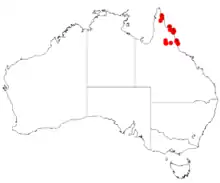| Heath wattle | |
|---|---|
| Scientific classification | |
| Kingdom: | Plantae |
| Clade: | Tracheophytes |
| Clade: | Angiosperms |
| Clade: | Eudicots |
| Clade: | Rosids |
| Order: | Fabales |
| Family: | Fabaceae |
| Subfamily: | Caesalpinioideae |
| Clade: | Mimosoid clade |
| Genus: | Acacia |
| Species: | A. legnota |
| Binomial name | |
| Acacia legnota | |
 | |
| Occurrence data from AVH | |
Acacia legnota, also known as heath wattle,[1] is a shrub of the genus Acacia and the subgenus Plurinerves that is endemic to an area of north eastern Australia.
Description
The shrub or small tree typically grows to a height of 2 to 4 m (6 ft 7 in to 13 ft 1 in) and has smooth, grey bark with obvious white lenticels and glabrous branchlets. Like most species of Acacia it has phyllodes rather than true leaves. The thin leathery, glabrous and evergreen phyllodes have a narrowly elliptic to oblanceolate-elliptic shape that is sickle shaped with a length of 12 to 18 cm (4.7 to 7.1 in) and a width of 8 to 19 mm (0.31 to 0.75 in) and has six to eight main nerves. When it blooms in June[1] produces simple inflorescences found in groups of two to four in the axils with spherical flower-heads that have a diameter of 5 to 6 mm (0.20 to 0.24 in) and contain about 35 golden coloured flowers. the glabrous and leathery seed pods that form later have a linear shape but are rounded over each of the seeds with a length of up to 12 cm (4.7 in) and a width of about 9 mm (0.35 in) and contain dull dark brown seeds with a broadly elliptic shape and a length of approximately 5 mm (0.20 in).[2]
Taxonomy
The species was first formally described by the botanist Leslie Pedley in 1978 as a part of the work A revision of Acacia Mill. in Queensland, Part 1 as published in the journal Austrobaileya. Pedley later reclassified it as Racosperma legnotum in 1987 but it was returned to genus Acacia in 2001.[3]
Distribution
It is found in far north and north eastern Queensland on the Cape York Peninsula and is reasonably common from around Cape Flattery to Cooktown along the coast with populations found as far west as the Iron Range area and down to around Cowley Beach in the south where it is often situated on dunes or in shrubby heathland communities usually often surrounding streams or lagoons growing in sandy soils.[2]
See also
References
- 1 2 "Heath Wattle Acacia legnota". Cairns to Cape Tribulation. Net Reach Media Pty Ltd. 2016. Retrieved 5 December 2020.
- 1 2 "Acacia legnota". World Wide Wattle. Western Australian Herbarium. Retrieved 5 December 2020.
- ↑ "Acacia legnota Pedley". Atlas of Living Australia. Global Biodiversity Information Facility. Retrieved 5 December 2020.